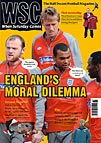 As England captain John Terry's affair with Wayne Bridge's former girlfriend became public knowledge, WSC 277 examined the press reaction and questioned what the most important attributes for a captain of a football team really are
As England captain John Terry's affair with Wayne Bridge's former girlfriend became public knowledge, WSC 277 examined the press reaction and questioned what the most important attributes for a captain of a football team really are
There’s a general rule to bear in mind if you’re unsure of what to think about a major talking point in football – find out Piers Morgan’s opinion then take the opposite view. In his latest Daily Mail column, the former Mirror editor declares that John Terry “is finished as England captain” now that his affair with Wayne Bridge’s former girlfriend has become public knowledge.
Even if Terry doesn’t step down voluntarily, “Fleet Street’s most merciless hounds” will continue to attack him until he goes. With his insider’s knowledge of the hypocrisy and humbug that our newspapers are capable of, Morgan’s prediction may come true – but that doesn’t make it right.
Given that he steadily built up a reputation for thick-headedness in various forms, it would be fair to say that John Terry is not widely liked by football supporters in general. Indeed, even the most ardent Chelsea fans would understand why many will have enjoyed seeing their captain in floods of tears after missing a crucial penalty in the 2008 Champions League final. However, no one deserves to be the whipping boy of the phony moralists of “Fleet Street” (now located in Wapping, from where the News of the World broke the story of Terry’s affair) not least when they haven’t broken any law. After all, a recent England manager had several affairs without coming under the threat of being sacked, the most notable of which was with an FA employee also involved with the organisation’s chief executive.
It would be fair to assume that Fabio Capello is perplexed by the importance attached to the holder of the armband in English football. In Italy, and just about everywhere else, a coach picks what he thinks of as his best 11 and then selects a captain from among them. Nonetheless, Capello wasn’t deterred by Terry’s problematic public image when making him captain.
If impeccable behaviour in their personal life is going to be a criterion for selecting a captain from now on, there really aren’t many options available to the England manager. Budding childen’s author Theo Walcott might just about pass muster, although he doesn’t seem especially suited to the role of clapping and shouting at set pieces.
Capello will still need to be convinced that removing Terry from the captaincy or dropping him altogether will be of benefit to the team. Successful football managers are relentlessly pragmatic and will stick by any players deemed to be useful.
George Graham incurred little disapproval for supporting Tony Adams when the latter was jailed in 1990 although the offence that had been committed, crashing a car while drunk, could have had far more serious consequences than an extra-marital affair. (A few days before the Terry story broke, Ashley Cole was banned from driving for doing 104 in a 50 zone, endangering everybody, yet there has been no call for him to be dumped.)
Histrionic pundits demanding that Terry be punished have cited the case of French midfielder Jean-François Larios who won his last cap, aged 25, at the 1982 World Cup during which it emerged that he had been having an affair with Michel Platini’s wife. But Larios was expendable at a time when France had an abundance of good midfielders and indeed went on to become European champions two years later under Platini’s captaincy. It’s inconceivable that Platini would have been dropped if he had been the one having the affair. While it’s perfectly understandable that Wayne Bridge wouldn’t want to play in the same team as Terry again, that ought to mean that he will be the one not going to South Africa.
The seething tone of much of the coverage is in part a reaction to Terry having sought legal action to prevent the affair being written about. But it’s also tapping into the undercurrent of popular revulsion at footballers’ wages and lifestyles. The spurious introduction of a “public interest” angle allows details of an affair to be rehashed while pundits claim not to be interested in the sordid business but only in how “it will affect England’s chances in South Africa”.
As Vanessa Perroncel has engaged the tabloids’ ubiquitous pal Max Clifford to put her side, we can expect several more weeks of revelations. In fact, with sports minister Gerry Sutcliffe insisting that being England captain “carries wider responsibility” – this in the middle of the Iraq War inquiry – the downfall of the “2009 Dad of the Year” might even seem like a useful distraction.
From WSC 277 March 2010